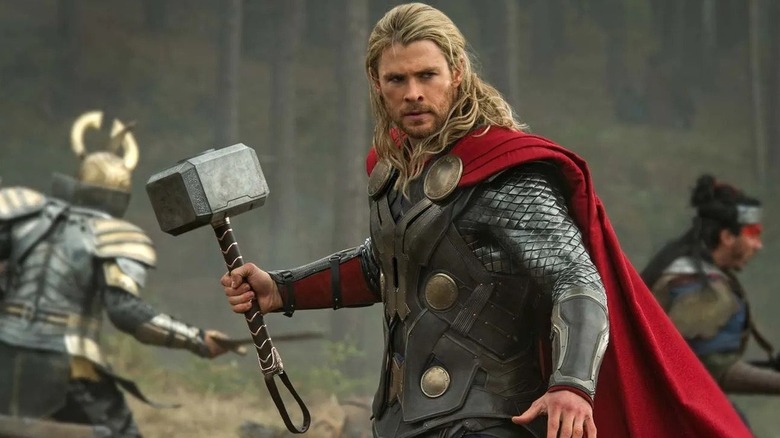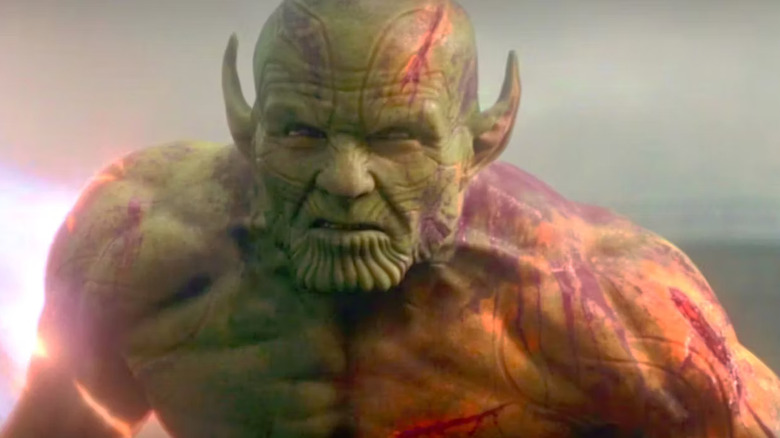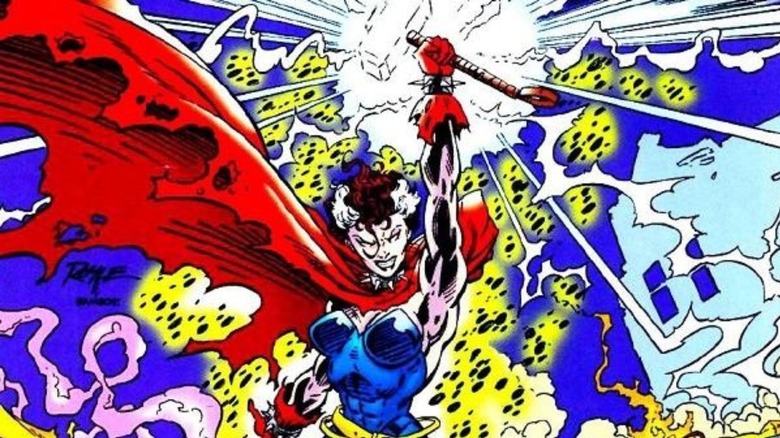Can A Super Skrull With Thor's Power Lift His Hammer Mjolnir? It's Complicated
With the season finale of "Secret Invasion," the Marvel Cinematic Universe has made it clear that Skrulls are here to stay — in fact, they may just be getting started.
The Disney+ series evolved the mythos first established in the MCU in 2019's "Captain Marvel" by revealing the potential for Skrulls to use their natural shape-shifting gifts to appropriate the powers and abilities of Earth's mightiest heroes. In the finale, Emilia Clarke's Skrull turncoat G'Iah attains a vast array of Avengers-level gifts, including the incredible strength of the Hulk, the cosmic powers of Captain Marvel, and even the might of Thor Odinson. That last one is particularly eye-catching, as it once again raises the question of how exactly Thor's powers work in the MCU, specifically which abilities are or aren't sourced from his hammer, Mjolnir.
At face value, G'Iah's appropriation of Thor's abilities seems like it would logically give her his powers of invulnerability, god-like strength, lightning manipulation, and — most importantly — the ability to wield Mjolnir. However, by using both the comics and previous films as evidence, it seems the answer to the question of G'Iah's "worthiness" goes far beyond a simple "yes" or "no."
Would Thor -- or G'Iah -- have powers without Mjolnir?
Based on their depiction in "Secret Invasion," it seems as though Super Skrulls can only absorb genetic qualities that manifest as superpowers. For example, they don't appear to be able to replicate learned abilities, such as Tony Stark's genius-level intellect or Stephen Strange's sorcery, and almost definitely couldn't integrate technological gifts such as Spider-Man's web shooters into their Skrull biology with DNA alone. So what would Thor's DNA give G'Iah? Based on the events of "Thor" and "Thor: Ragnarok," pretty much nothing.
Asgardian biological gifts amount to enhanced strength, speed, and durability, all of which G'Iah acquired (arguably in greater measure) via the Titan genetics of Thanos. Furthermore, Thor's specific, god-like physical enhancements seem not to be genetic qualities, but divine gifts that can be given and taken away by Odin. Though the All-Father proves to Thor in "Ragnarok" that his powers of lightning are at least in-part independent from his wielding of Mjolnir, these gifts seem to be an extension of his godhood rather than genetic superpowers.
In short, Thor's DNA is relatively useless to G'Iah and — unless "worthiness" comes down to genetic markers — is entirely irrelevant to her ability to lift Mjolnir. That is, until you consider the Rogue Principle.
By Rogue's standard, G'Iah could be worthy by appropriation alone
For those whose Marvel experience ends with the MCU, Rogue is a popular "X-Men" character with a mutation that allows her to absorb the life force and powers of anyone she touches. In one alternate timeline, this allowed her to wield Mjolnir without being technically worthy herself.
In a 1994 story titled "What if Rogue Possessed the Power of Thor?", Rogue drained Thor of his essence — so much so that she killed him, as a result — and was thus able to summon the hammer. By this logic, it would appear that the hammer could theoretically be tricked or otherwise summoned by someone with Thor's godly essence, even if they've recently exhibited such presumably unworthy acts as murdering innocent people.
While this one-off comic book story about mutant powers does not by any means confirm the capabilities of a Super Skrull's powers in the Marvel Cinematic Universe, it does create some precedence for someone to absorb Thor's worthiness. Whether or not this is true for G'Iah will ultimately come down to where future writers choose to take the character.


